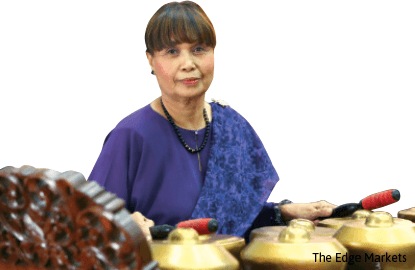
This article first appeared in Personal Wealth, The Edge Malaysia Weekly, on Dec 21 - 27, 2015.
Che Nor Mohaini Abdul Aziz does not believe in underdressing. She cuts a memorable figure with her bold jewellery and the blunt-edged fringe that frames her face. She is not ashamed to tell people that she is well into her sixth decade.

Looking rather perky despite having spent the morning golfing, she says her exuberance stems from embracing the simple fact that “there is still life after retirement”.
“It has been nothing short of an enriching experience. When I retired, I got the opportunity to focus on my personal development,” she says, looking self-assured.
Che Nor Mohaini is one of the 600-plus members of the University of Third Age (U3A) Malaysia — the moniker for the Association for Lifelong Learning of Older Persons Kuala Lumpur and Selangor — who have found a new lease of life through a smorgasbord of courses dedicated to promoting lifelong learning.
Now, at age 69, among other talents, she plays the bonang — a collection of small gongs — in a gamelan troupe; has completed a six-week course on playing the ukulele; and more recently, had her acrylic artwork exhibited alongside those of other members of the silver generation.
After retiring from the civil service in 2001, the sprightly sexagenarian decided to focus her energy on social work and enrolled in programmes offered under the U3A. Before retirement, the mother of two had spent a good two decades working and accompanying her diplomat husband around the world.
“I was involved in social work for a while and spent time with my grandchildren. But there is more I can do with the time I have to keep myself occupied,” she says.
The United Nations Population Division projects Malaysia’s over-60 population to hit 20.8% by 2050 compared with 6.6% in 2000. In tandem with that, life expectancy is projected to reach 80. To ensure that people go into their golden years in good health, wholesome changes have to made to economic, healthcare and social policies that are pivotal to nation building.
Learning new tricks
U3A president Datuk Abdul Ghani Abdullah says that as people age, “it is even more important that we make sure they are mentally healthy as much as they are physically healthy, so that they can continue to contribute in one way or another”.
The U3A project is a Malaysian initiative aimed at addressing the challenges that arise from having an ageing population. Spearheaded by the Malaysia Research Institute on Ageing (MyAgeing) at Universiti Putra Malaysia (UPM), the project was launched in 2007. It was funded by the Malaysian government and the United Nations Population Fund.
Following the tremendous response from senior citizens, the project evolved into an organisation administered by members of the U3A and the MyAgeing community. It is partially funded by the Ministry of Women, Family and Community Development.
Abdul Ghani says the courses are structured to be less academic and more hands-on. There are courses on thing like baking, languages, landscaping and minor repairs of electrical appliances as well as activities such as choir singing and ballroom dancing.
“These are not academic-type courses that require diligent studying. The purpose is to keep the seniors occupied, mentally and physically. This is one way to ensure that one doesn’t feel disregarded at this age and has something to look forward to,” says Abdul Ghani.
The most popular courses are the most ubiquitous as well, he says, referring to IT-related topics such as learning to use the computer and smartphones.
“Our children are too busy to teach us, so where do we learn? It is quite difficult unless classes are organised. People at my age have very sophisticated phones but don’t know how to utilise them fully. They know how to make and receive calls, send and receive messages, but smartphones have a lot more functions that could make life much easier for us,” says the 74-year-old retired army general.
Participants pay RM80 for three courses, which are then conducted over a period of 18 months. To keep overheads low, the programmes are held at UPM’s facilities in Serdang. But they will eventually be conducted at several community colleges in Kuala Lumpur and Selangor to serve the larger community.
While most retirees participate in the programmes to keep themselves occupied, the courses are structured in a way that allows them to also earn an income so they can be self-sufficient.
“Our facilitators and tutors teach them gardening, landscaping and minor repair and servicing skills, so if they want, they can go off on their own and start a small business like selling vegetables in their housing area,” says Abdul Ghani.
“Some of the arts and crafts participants can even sell the ceramics, paintings and crafts they make. With the knowledge we impart, they can make the products and we can do exhibitions as well. Hopefully one day, they will be marketable,” he adds.
“The mindset is starting to change. Our pensioners and retirees are more educated and these days, even in retirement, they have to keep up with the latest things. Our job is to help them move in that direction.”
With fewer years to prepare for an ageing society — developed countries like France took more than a century (1865 to 1980) to double its over-65 population — there is a pressing need to get started as Malaysia transitions into an aged nation, says Abdul Ghani.
“There should a central body that oversees all aspects of the population, with inputs from all stakeholders like experts on ageing, the health ministry and societies like ours who can analyse, organise and plan the kind of policies and programmes needed to best address the issues.”
Save by subscribing to us for your print and/or digital copy.
P/S: The Edge is also available on Apple's AppStore and Androids' Google Play.